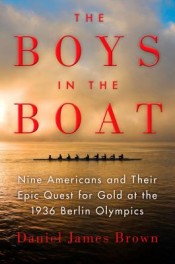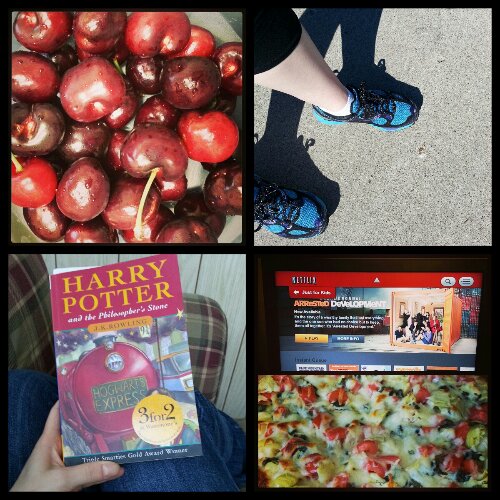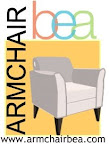Title: The Boys in the Boat: Nine Americans and Their Epic Quest for Gold at the 1936 Berlin Olympics
Author: Daniel James Brown
Genre: Narrative nonfiction
Year: 2013
Publisher: Viking Adult
Acquired: From the publisher for review consideration
Rating: 




Review: One of my favorite movies is Miracle, the story of the 1980 United States Olympic hockey team — a rag-tag group of college hockey players from across the United States and their enigmatic but inspirational coach Herb Brooks. The powerhouse team, at the time, was the Soviet Union; given that it was the Cold War and the Olympics were being held in Lake Placid, there was a lot of patriotic zeal going into the games. I love the classic early ’80s fashion, Brooks’ sporting platitudes (“The legs feed the wolf, gentlemen!”), and the lesson about hard work and humility ultimately winning the day. It’s cheesy, I know, but I just eat it up.
I tell you that story because Daniel James Brown’s The Boys in the Boat is basically Miracle set in 1936. That may sound dismissive, but I assure that it it’s not. It just helps explain why I adored this book so much.
The setting for The Boys in the Boat is another fraught Olympic games, the 1936 Berlin games. At the time, Adolf Hitler had already taken power in Germany and begun his assault on Jews and other minorities, but the rest of the world didn’t want to look. Hitler planned to use the games to demonstrate German dominance at sports and show the world that everything in Germany was going just fine, thank you very much.
The sport in The Boys in the Boat is rowing, specifically eight-oar crew, and a team of working-class college boys from the University of Washington. At the heart of the story is Joe Rentz, a kid literally abandoned by his family when it was a teen who first started racing crew as a way to help pay for his college education. Another emotional rock in the story is George Yeoman Pocock, the most talented boat builder of his time who serves as mentor for Joe and the boys during their raced to qualify for the Oympics and then race for the gold.
There are so many things to love in this book. Joe is the heart of the story in many ways, but the rest of the team is equally as wonderful to read about, especially in the context of how Brown describes the sport of rowing. It has a history as a sport of the elite, yet the men of the Olympic team came from humble beginnings as “farmers, fishermen and lumberjacks.” Brown makes an argument that their working-class origins game them an advantage in a sport that requires both confidence and concessions to your teammates, and the story of the underdog is always emotionally resonant.
I was also impressed by the way Brown wrote about each of the races. Going into the book I knew absolutely nothing about how rowing works, but by the end I felt myself getting sucked into the way he described each race, nervous that the strategy the coxswain (the little guy in the front who sets the pace) was employing would work and tense with concern over whether the boys could actually pull it off. The description of the race for Olympic gold was so heated I actually felt relieved when it was over (and triumphant because the cheating Germans didn’t win!).
I know intellectually that the book leaned a little heavy on sappiness at times and that some of Brown’s conclusions about what make this particular group of young men so remarkable might be a bit of an overreach, but I honestly didn’t care at all. I was emotionally engaged with this book 100 percent, which is not something that happens very often. The Boys in the Boat was just a great read from beginning to end. I don’t think that I’ll stop gushing about it for quite some time.
Other Reviews: Seattle Times (this is a great review) | Publisher’s Weekly |
If you have reviewed this book, please leave a link to the review in the comments and I will add your review to the main post. All I ask is for you to do the same to mine — thanks!



